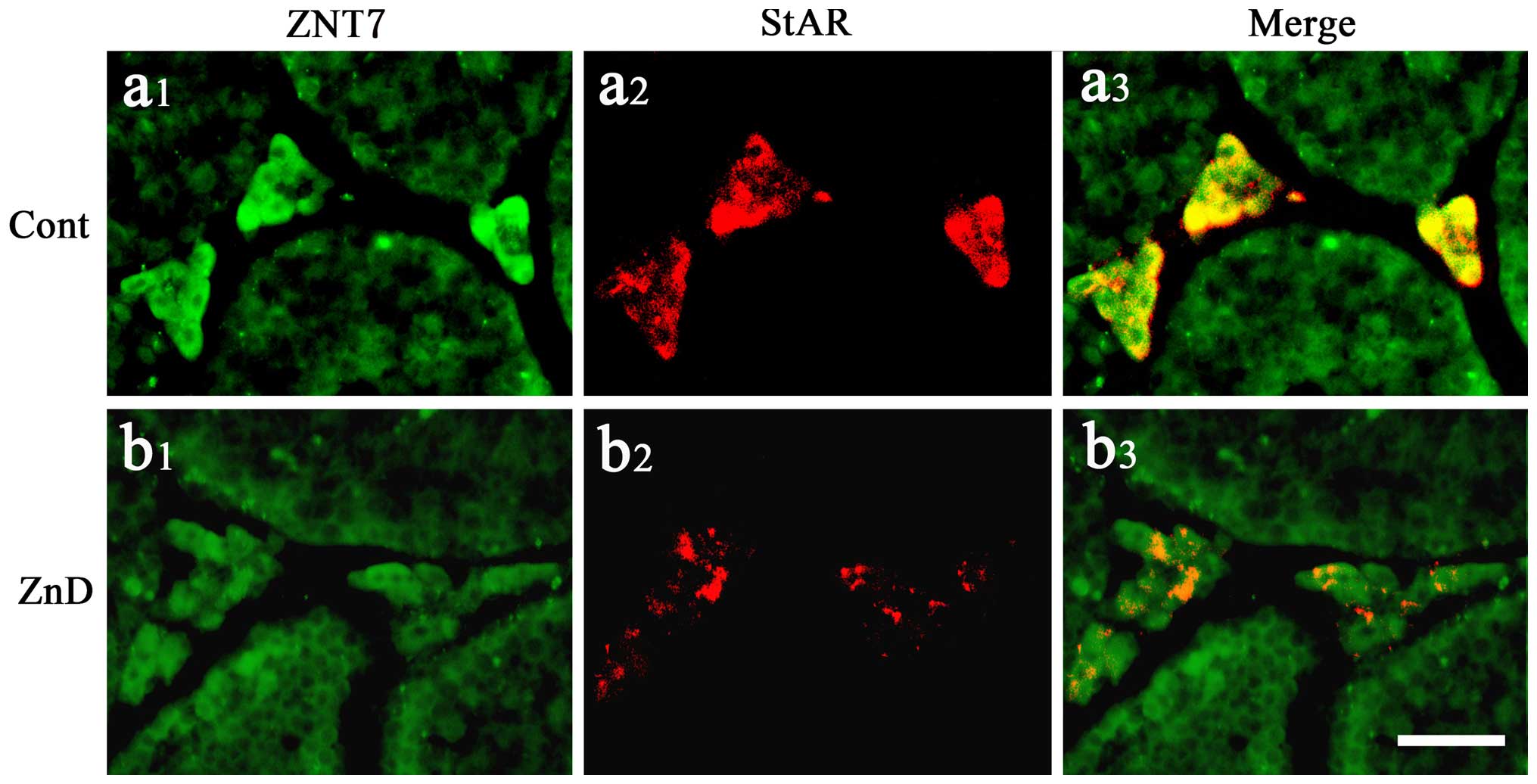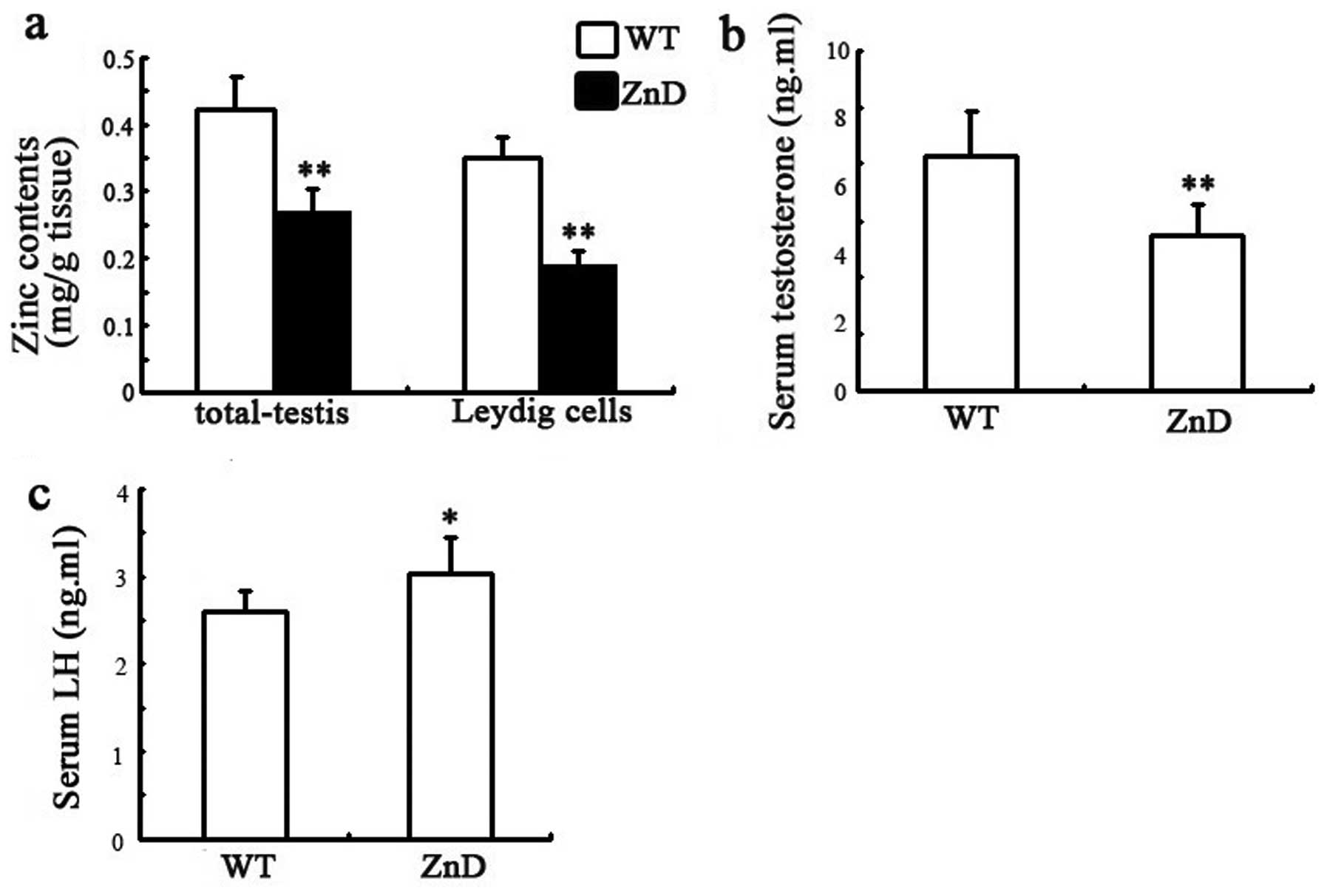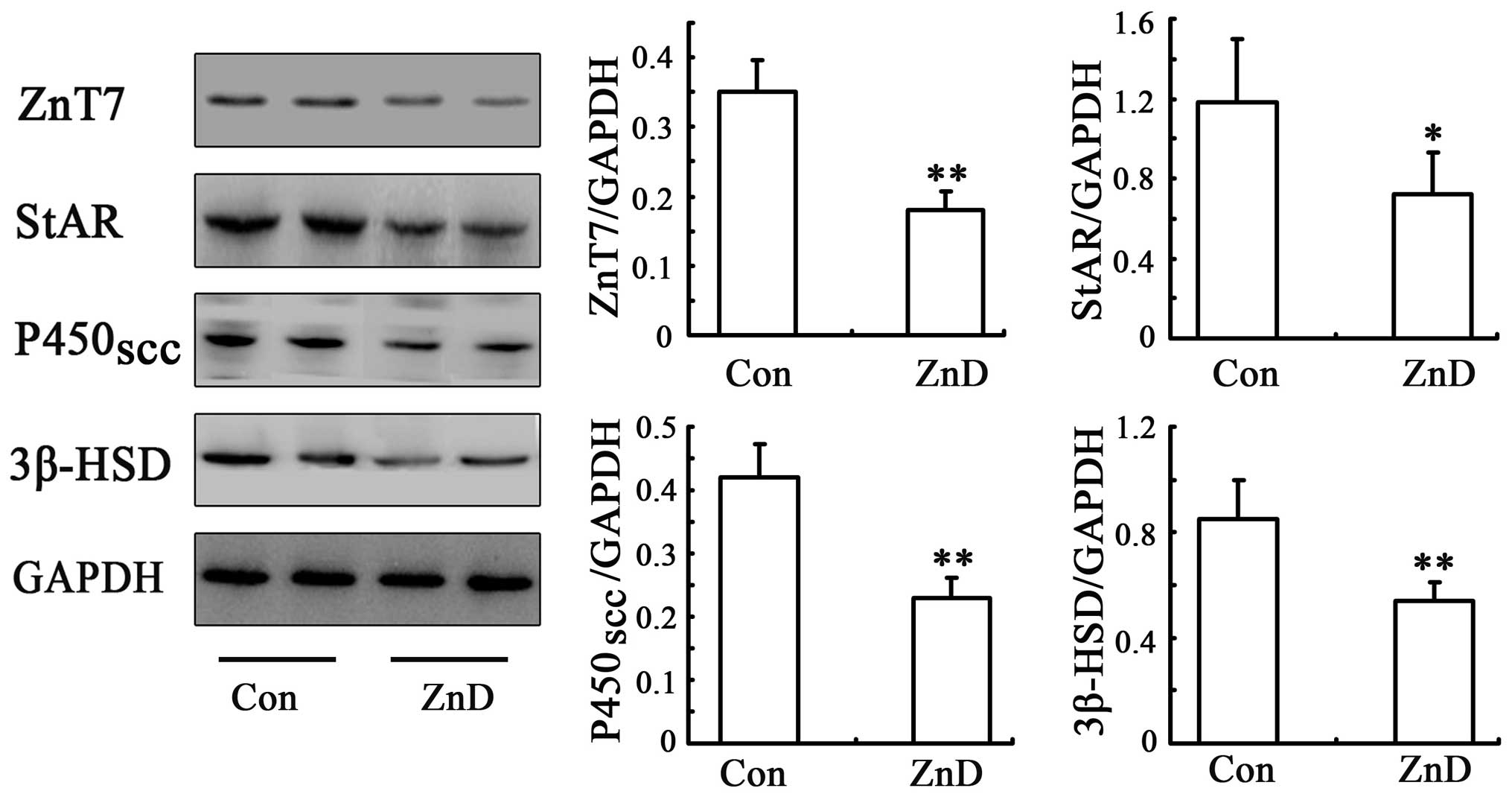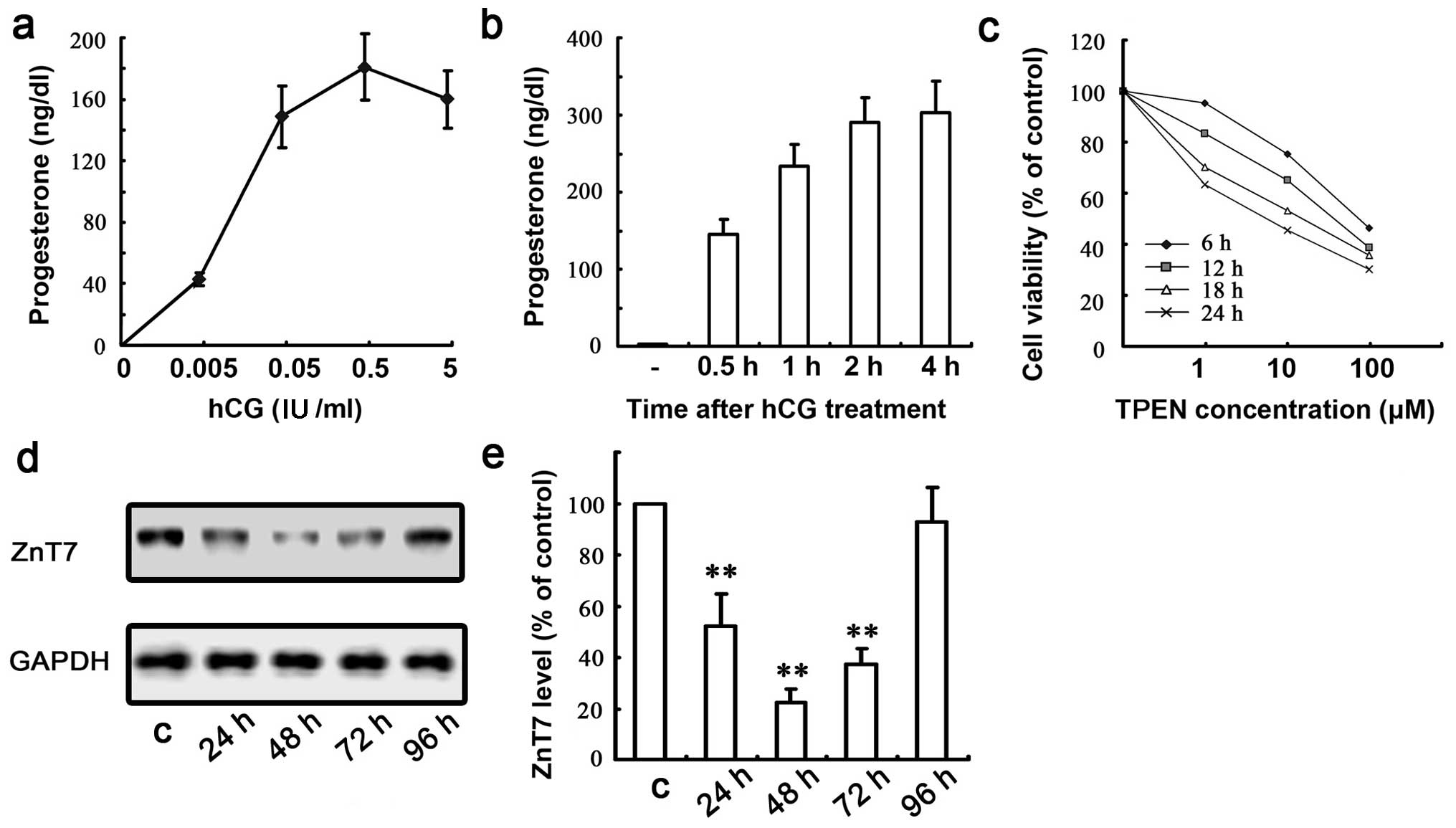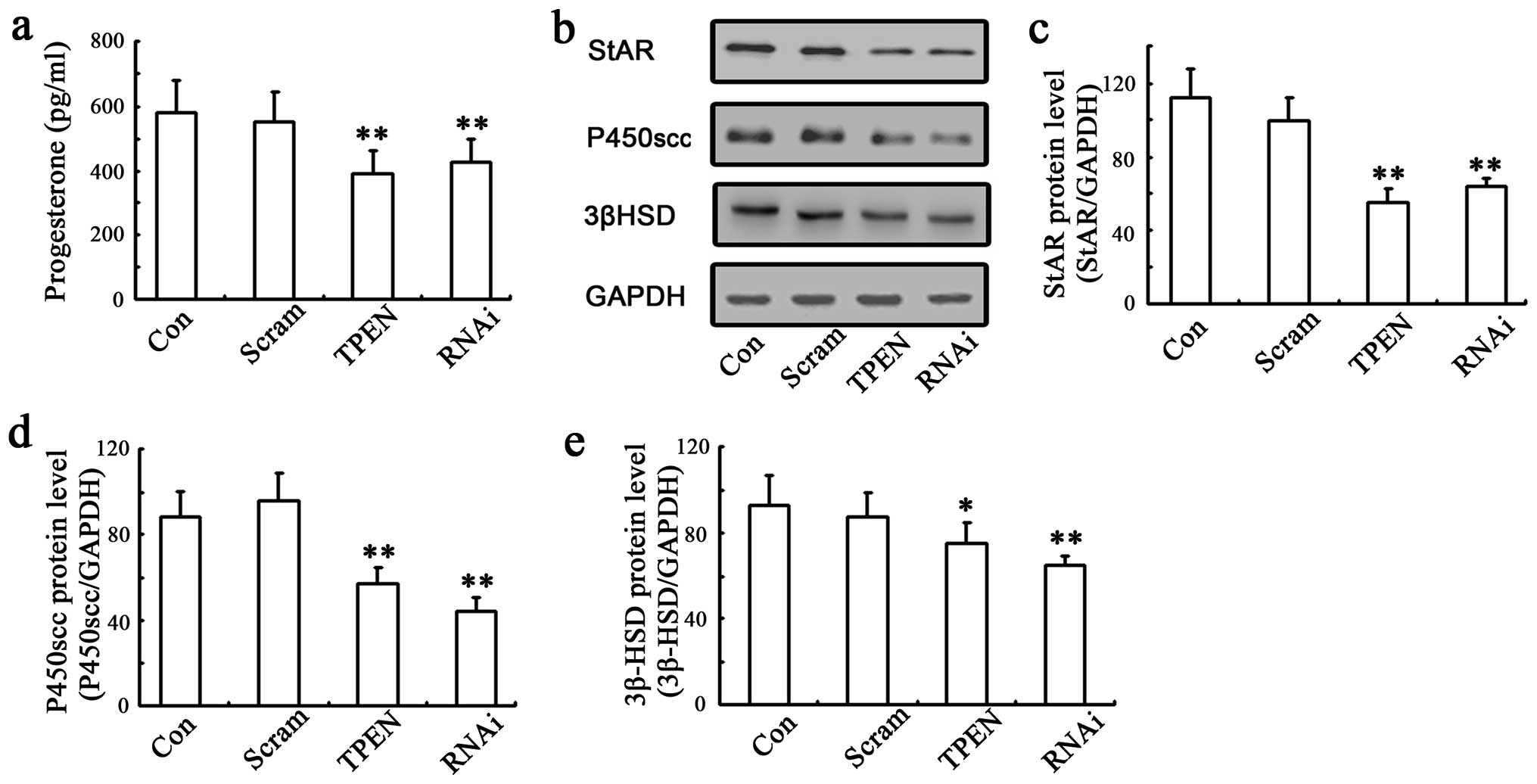|
1
|
Hidiroglou M and Knipfel JE: Zinc in
mammalian sperm: a review. J Dairy Sci. 67:1147–1156. 1984.
View Article : Google Scholar : PubMed/NCBI
|
|
2
|
Coleman JE: Zinc proteins: enzymes,
storage proteins, transcription factors, and replication proteins.
Annu Rev Biochem. 61:897–946. 1992. View Article : Google Scholar : PubMed/NCBI
|
|
3
|
Hartoma TR, Nahoul K and Netter A: Zinc,
plasma androgens and male sterility. Lancet. 2:1125–1126. 1977.
View Article : Google Scholar : PubMed/NCBI
|
|
4
|
Aihara K, Nishi Y, Hatano S, Kihara M,
Ohta M, Sakoda K, Uozumi T and Usui T: Zinc, copper, manganese, and
selenium metabolism in patients with human growth hormone
deficiency or acromegaly. J Pediatr Gastroenterol Nutr. 4:610–615.
1985. View Article : Google Scholar : PubMed/NCBI
|
|
5
|
Bedwal RS and Bahuguna A: Zinc, copper and
selenium in reproduction. Experientia. 50:626–640. 1994. View Article : Google Scholar : PubMed/NCBI
|
|
6
|
El Hendy HA, Yousef MI and Abo El-Naga NI:
Effect of dietary zinc deficiency on hematological and biochemical
parameters and concentrations of zinc, copper, and iron in growing
rats. Toxicology. 167:163–170. 2001. View Article : Google Scholar : PubMed/NCBI
|
|
7
|
Matossian MK: Fertility decline in Europe
1875–1913. Was zinc deficiency the cause? Perspect Biol Med.
34:604–616. 1991. View Article : Google Scholar : PubMed/NCBI
|
|
8
|
Brown KH and Wuehler SE: Zinc and human
health: results of recent trials and implications for program
interventions and research. Micronutrient Initiative; Ottawa:
2000
|
|
9
|
Hesketh JE: Effects of dietary zinc
deficiency on Leydig cell ultrastructure in the boar. J Comp
Pathol. 92:239–247. 1982. View Article : Google Scholar : PubMed/NCBI
|
|
10
|
Lei KY, Abbasi A and Prasad AS: Function
of pituitary-gonadal axis in zinc-deficient rats. Am J Physiol.
230:1730–1732. 1976.PubMed/NCBI
|
|
11
|
Hadwan MH, Almashhedy LA and Alsalman AR:
Study of the effects of oral zinc supplementation on peroxynitrite
levels, arginase activity and NO synthase activity in seminal
plasma of Iraqi asthenospermic patients. Reprod Biol Endocrinol.
12:12014. View Article : Google Scholar : PubMed/NCBI
|
|
12
|
Abbasi AA, Prasad AS and Rabbani PR:
Experimental zinc deficiency in man: effect on spermatogenesis.
Trans Assoc Am Physicians. 92:292–302. 1979.PubMed/NCBI
|
|
13
|
Khan MS, Zaman S, Sajjad M, Shoaib M and
Gilani G: Assessment of the level of trace element zinc in seminal
plasma of males and evaluation of its role in male infertility. Int
J Appl Basic Med Res. 1:93–96. 2011. View Article : Google Scholar : PubMed/NCBI
|
|
14
|
Chasapis CT, Loutsidou AC, Spiliopoulou CA
and Stefanidou ME: Zinc and human health: an update. Arch Toxicol.
86:521–534. 2012. View Article : Google Scholar
|
|
15
|
Kambe T, Yamaguchi-Iwai Y, Sasaki R and
Nagao M: Overview of mammalian zinc transporters. Cell Mol Life
Sci. 61:49–68. 2004. View Article : Google Scholar : PubMed/NCBI
|
|
16
|
Palmiter RD and Huang L: Efflux and
compartmentalization of zinc by members of the SLC30 family of
solute carriers. Pflugers Arch. 447:744–751. 2004. View Article : Google Scholar
|
|
17
|
Kambe T, Hashimoto A and Fujimoto S:
Current understanding of ZIP and ZnT zinc transporters in human
health and diseases. Cell Mol Life Sci. 71:3281–3295. 2014.
View Article : Google Scholar : PubMed/NCBI
|
|
18
|
Palmiter RD, Cole TB, Quaife CJ and
Findley SD: ZnT-3, a putative transporter of zinc into synaptic
vesicles. Proc Natl Acad Sci USA. 93:14934–14939. 1996. View Article : Google Scholar : PubMed/NCBI
|
|
19
|
Cole TB, Wenzel HJ, Kafer KE,
Schwartzkroin PA and Palmiter RD: Elimination of zinc from synaptic
vesicles in the intact mouse brain by disruption of the ZnT3 gene.
Proc Natl Acad Sci USA. 96:1716–1721. 1999. View Article : Google Scholar : PubMed/NCBI
|
|
20
|
Kambe T, Narita H, Yamaguchi-Iwai Y,
Hirose J, Amano T, Sugiura N, Sasaki R, Mori K, Iwanaga T and Nagao
M: Cloning and characterization of a novel mammalian zinc
transporter, zinc transporter 5, abundantly expressed in pancreatic
beta cells. J Biol Chem. 277:19049–19055. 2002. View Article : Google Scholar : PubMed/NCBI
|
|
21
|
Kirschke CP and Huang L: ZnT7, a novel
mammalian zinc transporter, accumulates zinc in the Golgi
apparatus. J Biol Chem. 278:4096–4102. 2003. View Article : Google Scholar
|
|
22
|
Lemaire K, Chimienti F and Schuit F: Zinc
transporters and their role in the pancreatic β-cell. J Diabetes
Investig. 3:202–211. 2012. View Article : Google Scholar : PubMed/NCBI
|
|
23
|
Chimienti F, Devergnas S, Favier A and
Seve M: Identification and cloning of a beta-cell-specific zinc
transporter, ZnT-8, localized into insulin secretory granules.
Diabetes. 53:2330–2337. 2004. View Article : Google Scholar : PubMed/NCBI
|
|
24
|
Kambe T, Weaver BP and Andrews GK: The
genetics of essential metal homeostasis during development.
Genesis. 46:214–228. 2008. View Article : Google Scholar : PubMed/NCBI
|
|
25
|
Jiang MH, Cai B, Tuo Y, Wang J, Zang ZJ,
Tu X, Gao Y, Su Z, Li W, Li G, et al: Characterization of
Nestin-positive stem Leydig cells as a potential source for the
treatment of testicular Leydig cell dysfunction. Cell Res.
24:1466–1485. 2014. View Article : Google Scholar : PubMed/NCBI
|
|
26
|
Wang H, Wang Q, Zhao XF, Liu P, Meng XH,
Yu T, Ji YL, Zhang H, Zhang C, Zhang Y and Xu DX: Cypermethrin
exposure during puberty disrupts testosterone synthesis via
downregu-lating StAR in mouse testes. Arch Toxicol. 84:53–61. 2010.
View Article : Google Scholar
|
|
27
|
Caron KM, Soo SC, Wetsel WC, Stocco DM,
Clark BJ and Parker KL: Targeted disruption of the mouse gene
encoding steroidogenic acute regulatory protein provides insights
into congenital lipoid adrenal hyperplasia. Proc Natl Acad Sci USA.
94:11540–11545. 1997. View Article : Google Scholar : PubMed/NCBI
|
|
28
|
King SR, Manna PR, Ishii T, Syapin PJ,
Ginsberg SD, Wilson K, Walsh LP, Parker KL, Stocco DM, Smith RG and
Lamb DJ: An essential component in steroid synthesis, the
steroidogenic acute regulatory protein, is expressed in discrete
regions of the brain. J Neurosci. 22:10613–10620. 2002.PubMed/NCBI
|
|
29
|
Stocco DM and Clark BJ: The role of the
steroidogenic acute regulatory protein in steroidogenesis.
Steroids. 62:29–36. 1997. View Article : Google Scholar : PubMed/NCBI
|
|
30
|
Raucci F, D'Aniello A and Di Fiore MM:
Stimulation of androgen production by D-aspartate through the
enhancement of StAR, P450scc and 3β-HSD mRNA levels in vivo rat
testis and in culture of immature rat Leydig cells. Steroids.
84:103–110. 2014. View Article : Google Scholar : PubMed/NCBI
|
|
31
|
Stocco DM: StAR protein and the regulation
of steroid hormone biosynthesis. Annu Rev Physiol. 63:193–213.
2001. View Article : Google Scholar : PubMed/NCBI
|
|
32
|
Hu Y, Dong C, Chen M, Lu J, Han X, Qiu L,
Chen Y, Qin J, Li X, Gu A, et al: Low-dose monobutyl phthalate
stimulates steroidogenesis through steroidogenic acute regulatory
protein regulated by SF-1, GATA-4 and C/EBP-beta in mouse Leydig
tumor cells. Reprod Biol Endocrinol. 11:722013. View Article : Google Scholar : PubMed/NCBI
|
|
33
|
Pakarinen P, Vihko KK, Voutilainen R and
Huhtaniemi I: Differential response of luteinizing hormone receptor
and steroidogenic enzyme gene expression to human chorionic
gonadotropin stimulation in the neonatal and adult rat testis.
Endocrinology. 127:2469–2474. 1990. View Article : Google Scholar : PubMed/NCBI
|
|
34
|
Baba Y: Effect of HCG administration in
the gossypol-treated male rats. Hinyokika Kiyo. 34:643–647. 1988.In
Japanese. PubMed/NCBI
|
|
35
|
Scott IS, Charlton HM, Cox BS, Grocock CA,
Sheffield JW and O'Shaughnessy PJ: Effect of LH injections on
testicular steroidogenesis, cholesterol side-chain cleavage P450
mRNA content and Leydig cell morphology in hypogonadal mice. J
Endocrinol. 125:131–138. 1990. View Article : Google Scholar : PubMed/NCBI
|
|
36
|
Xu Z, Kawai M, Bandiera SM and Chang TK:
Influence of dietary zinc deficiency during development on hepatic
CYP2C11, CYP2C12, CYP3A2, CYP3A9, and CYP3A18 expression in
postpubertal male rats. Biochem Pharmacol. 62:1283–1291. 2001.
View Article : Google Scholar : PubMed/NCBI
|
|
37
|
Croxford TP, McCormick NH and Kelleher SL:
Moderate zinc deficiency reduces testicular Zip6 and Zip10
abundance and impairs spermatogenesis in mice. J Nutr. 141:359–365.
2011. View Article : Google Scholar : PubMed/NCBI
|
|
38
|
Favier AE: The role of zinc in
reproduction. Hormonal mechanisms. Biol Trace Elem Res. 32:363–382.
1992. View Article : Google Scholar : PubMed/NCBI
|
|
39
|
Om AS and Chung KW: Dietary zinc
deficiency alters 5 alpha-reduction and aromatization of
testosterone and androgen and estrogen receptors in rat liver. J
Nutr. 126:842–848. 1996.PubMed/NCBI
|
|
40
|
Qureshi IZ and Abbas Q: Modulation of
testicular and whole blood trace element concentrations in
conjunction with testosterone release following kisspeptin
administration in male rabbits (Oryctolagus cuniculus). Biol Trace
Elem Res. 154:210–216. 2013. View Article : Google Scholar : PubMed/NCBI
|
|
41
|
Sunderman FW Jr: The influence of zinc on
apoptosis. Ann Clin Lab Sci. 25:134–142. 1995.PubMed/NCBI
|
|
42
|
Vallee BL and Falchuk KH: The biochemical
basis of zinc physiology. Physiol Rev. 73:79–118. 1993.PubMed/NCBI
|
|
43
|
Prasad AS: Clinical and biochemical
manifestation zinc deficiency in human subjects. J Pharmacol.
16:344–352. 1985.PubMed/NCBI
|
|
44
|
Root AW, Duckett G, Sweetland M and Reiter
EO: Effects of zinc deficiency upon pituitary function in sexually
mature and immature male rats. J Nutr. 109:958–964. 1979.PubMed/NCBI
|
|
45
|
Huang L and Tepaamorndech S: The SLC30
family of zinc transporters - a review of current understanding of
their biological and pathophysiological roles. Mol Aspects Med.
34:548–560. 2013. View Article : Google Scholar : PubMed/NCBI
|
|
46
|
Kelleher SL, Seo YA and Lopez V: Mammary
gland zinc metabolism: regulation and dysregulation. Genes Nutr.
4:83–94. 2009. View Article : Google Scholar : PubMed/NCBI
|
|
47
|
Chi ZH, Feng WY, Gao HL, Zheng W, Huang L
and Wang ZY: ZNT7 and Zn2+ are present in different cell
populations in the mouse testis. Histol Histopathol. 24:25–30.
2009.
|
|
48
|
Chi ZH, Ren H, Wang X, Rong M, Huang L and
Wang ZY: The cellular and subcellular localization of zinc
transporter 7 in the mouse spinal cord. Histol Histopathol.
23:781–787. 2008.PubMed/NCBI
|
|
49
|
Huang L, Yan M and Kirschke CP:
Over-expression of ZnT7 increases insulin synthesis and secretion
in pancreatic beta-cells by promoting insulin gene transcription.
Exp Cell Res. 316:2630–2643. 2010. View Article : Google Scholar : PubMed/NCBI
|
|
50
|
Mukherjee S, Chiu R, Leung SM and Shields
D: Fragmentation of the Golgi apparatus: an early apoptotic event
independent of the cytoskeleton. Traffic. 8:369–378. 2007.
View Article : Google Scholar : PubMed/NCBI
|
|
51
|
Chi ZH, Wang X, Wang ZY, Gao HL, Dahlstrom
A and Huang L: Zinc transporter 7 is located in the cis-Golgi
apparatus of mouse choroid epithelial cells. Neuroreport.
17:1807–1811. 2006. View Article : Google Scholar : PubMed/NCBI
|















